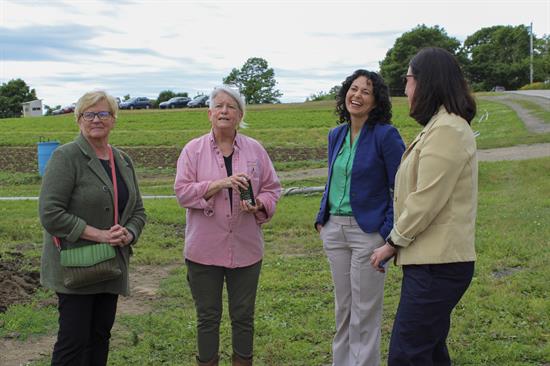Press Releases
Pingree Hosts Deputy Agriculture Sec. Torres Small in Maine, Highlights Infrastructure Needs to Support Locally Grown Food
SOUTH PORTLAND, MAINE,
June 21, 2024
Tags:
Food and Agriculture
On Friday, Maine First District Congresswoman Chellie Pingree, a longtime organic farmer and member of the House Agriculture Committee, hosted U.S. Department of Agriculture (USDA) Deputy Secretary Xochitl Torres Small in Maine, highlighting local food infrastructure and processing. Pingree and Torres Small were joined by Maine Commissioner of Agriculture Amanda Beal as well as local farmers, processors, and agricultural industry leaders on a tour of Fork Food Lab in South Portland before convening a roundtable discussion on the Biden Administration’s efforts to increase local food systems infrastructure. Later, Pingree and Torres Small visited Jordan’s Farm, a 5th-generation farm in Cape Elizabeth. “I consistently hear from producers in Maine about the urgent need for infrastructure to process their produce, dairy, meat, and poultry, locally. Their livelihoods depend on it,” said Pingree. “Today, Deputy Secretary Torres Small and I heard directly from Mainers who are seeing the benefits of continued support from the Biden Administration through federal programs such as the Meat and Poultry Inspection Readiness Grant (MPIRG), the Local Agriculture Market Program (LAMP) and more. Whether by helping meat and poultry processors make necessary facility improvements and grow their businesses or helping farms boost production and expand markets for their value-added agricultural products, USDA programs are critical to strengthening our food system and boosting our food economy. As I continue to work to deliver a comprehensive Farm Bill that meets the needs of our farmers and agricultural communities, I am grateful to have a partner in the Biden Administration supporting locally grown food for Maine.” "Investing in the resilience of local and regional food systems pays dividends for consumers and producers alike, and USDA has a strong partner in this effort in Representative Pingree," said Agriculture Deputy Secretary Torres Small. "Thanks to President Biden's support for businesses like Food Fork Lab, USDA is lowering costs for American families, strengthening the food system, leveling the playing field for producers, and helping consumers access fresh, locally grown food closer to home. I look forward to Representative Pingree's continued partnership as we work together to support producers in Maine and nationwide." Fork Food Lab has received several federal grants from USDA in recent years, including a Meat and Poultry Inspection Readiness Grant (MPIRG) to expand their meat processing capabilities. MPIRG funds were authorized through the fiscal year 2021 appropriations bill. Pingree, alongside Rep. Jim Baird (R-Ind.) and U.S. Senators John Thune (R-S.D.) and Sherrod Brown (D-Ohio), introduced the bipartisan, bicameral Strengthening Local Processing Act to diversify and make the U.S. meat processing more resilient by giving local livestock and poultry producers more options will increase processing options for local livestock and poultry producers. Elements of the bill are included in both the House Farm Bill and Senator Stabenow’s draft Farm Bill. As a senior member of the House Agriculture Committee and House Appropriations Subcommittee on Agriculture, Pingree has made expanding access to healthy and locally grown food top priorities. In addition to the Strengthening Local Processing Act, Pingree is the lead sponsor of the Local Farms and Food Act, which would simplify applications for certain Farmers Market and Local Food Promotion Program projects, increase funding for the Local Agriculture Market Program, reauthorize the Senior Farmers Market Nutrition Program, reduce barriers to the Gus Schumacher Nutrition Incentive Program (GusNIP), and build upon the GusNIP Produce Prescription Program, The 2018 Farm Bill included Pingree’s provisions to create the first full-time food loss and waste reduction liaison at USDA, a composting and food waste reduction pilot program, and the Local Agriculture Market Program to enhance market access for local producers. ### |

